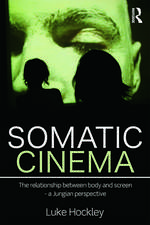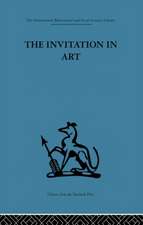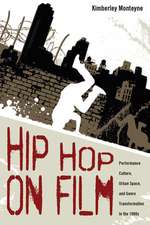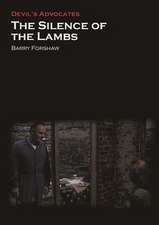Crisis Cinema in the Middle East: Creativity and Constraint in Iran and the Arab World
Autor Shohini Chaudhurien Limba Engleză Paperback – 24 ian 2024
| Toate formatele și edițiile | Preț | Express |
|---|---|---|
| Paperback (1) | 193.70 lei 6-8 săpt. | |
| Bloomsbury Publishing – 24 ian 2024 | 193.70 lei 6-8 săpt. | |
| Hardback (1) | 541.93 lei 3-5 săpt. | |
| Bloomsbury Publishing – 13 iul 2022 | 541.93 lei 3-5 săpt. |
Preț: 193.70 lei
Preț vechi: 250.64 lei
-23% Nou
Puncte Express: 291
Preț estimativ în valută:
37.07€ • 40.25$ • 31.14£
37.07€ • 40.25$ • 31.14£
Carte tipărită la comandă
Livrare economică 22 aprilie-06 mai
Preluare comenzi: 021 569.72.76
Specificații
ISBN-13: 9781350190559
ISBN-10: 1350190551
Pagini: 328
Ilustrații: 19 bw illus
Dimensiuni: 156 x 234 x 25 mm
Greutate: 0.46 kg
Editura: Bloomsbury Publishing
Colecția Bloomsbury Academic
Locul publicării:London, United Kingdom
ISBN-10: 1350190551
Pagini: 328
Ilustrații: 19 bw illus
Dimensiuni: 156 x 234 x 25 mm
Greutate: 0.46 kg
Editura: Bloomsbury Publishing
Colecția Bloomsbury Academic
Locul publicării:London, United Kingdom
Caracteristici
Focuses on a wide range of cinematic examples from award-winning, festival favourites such as Five Broken Cameras (2011), Persepolis (2007) and Kiarostami's About Elly (2009) to lesser-known films from the Middle East/Arab world, all the while introducing comparative examples from crisis situations elsewhere for a nuanced regional/international understanding of crisis and creativity.
Notă biografică
Shohini Chaudhuri is a Professor in the Department of Literature, Film and Theatre Studies at the University of Essex, UK. Her main research and teaching area is World Cinema, with particular interests in film and human rights, film-philosophy, feminist and postcolonial theory. Her work develops transnational and comparative frameworks to explore links between different film cultures. She is the author of Cinema of the Dark Side: Atrocity and the Ethics of Film Spectatorship (2014), Feminist Film Theorists (2006) and Contemporary World Cinema (2005).
Cuprins
Table of Contents Introduction1. Witnessing2. Mapping space and memory3. Animation4. Child actors5. The road movie6. Humour7. Adaptation8. Online archives9. Music10. Science-fiction/dystopiaConclusion
Recenzii
Crisis Cinema in the Middle East is an absolute tour de force. Chaudhuri's account of the dynamics of creativity and constraint in Iranian and Middle Eastern filmmaking offers deep and compelling insights into the nature of freedom of expression. Engagingly written and theoretically astute, this is, quite simply, one of the best books I have read in a very long time.
Shohini Chaudhuri masterfully captures the complex and paradoxical relationship between the notion of creativity and various constraints filmmakers face in Iran and the Arab world. This book offers a fresh and unique study of filmmaking practices across the region from production to distribution organised in nine chapters, each representing a creative solution these filmmakers have employed considering those constraints. This is an essential reading for anyone interested in cinema of the region and an important contribution to global and transnational cinema studies in general.
Elegantly written and highly informed, Chaudhuri's book first expands our understanding of the immense constraints - political, social, economical - facing Iranian and Arab filmmakers to quickly transcend them through meticulous examinations into an incredibly wide array of creative responses and strategies. A must-read in Middle Eastern Film Studies!
Shohini Chaudhuri masterfully captures the complex and paradoxical relationship between the notion of creativity and various constraints filmmakers face in Iran and the Arab world. This book offers a fresh and unique study of filmmaking practices across the region from production to distribution organised in nine chapters, each representing a creative solution these filmmakers have employed considering those constraints. This is an essential reading for anyone interested in cinema of the region and an important contribution to global and transnational cinema studies in general.
Elegantly written and highly informed, Chaudhuri's book first expands our understanding of the immense constraints - political, social, economical - facing Iranian and Arab filmmakers to quickly transcend them through meticulous examinations into an incredibly wide array of creative responses and strategies. A must-read in Middle Eastern Film Studies!























